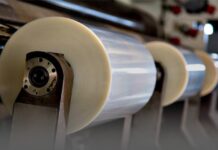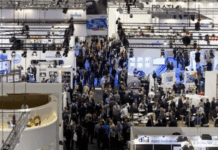
Constantia Flexibles has been selected as one of 50 global companies to take part in the international sustainability and climate initiative for 2020. Initiated by the TBD media group, the initiative promotes companies that are pioneers in the field of sustainability and is hosted by Bloomberg’s digital network.
‘More sustainability’ along the entire production supply chain always has been a priority for Constantia Flexibles. The presentation of the ‘more sustainable’ product line EcoLamin 2019, the opening of Ecoflex, the first plant in the world producing recyclable flexible packaging only, as well as the ambitious target to almost halve greenhouse gas emissions by 2050, are examples of the company’s leadership in sustainability.
Globally and across all industries, climate change and sustainability have grown in importance. Constantia Flexibles, the world’s third-largest producer of flexible packaging solutions, takes these worrying developments very seriously. The CEO of Constantia Flexibles, Alexander Baumgartner, says, “We as human beings and even more so as companies have a duty to fulfill, which is to leave the planet at least in the same shape and state it was when we came, for the next generations. Our participation in the 50 Sustainability and Climate Leaders initiative is a further measure for us to fulfill this duty. In the video, we are demonstrating how companies worldwide can also make their contribution.”
Being part of the 50 Sustainability & Climate Leaders campaign is an integral part of the company’s sustainability strategy focusing on the long-term. With the reach of Bloomberg’s digital network and the close collaboration of the United Nations in the campaign, the company wants to prove what is possible. Speaking in an exclusive conference hosted by the UN – planned to take place in September 2020 in New York –Constantia Flexibles will engage with the other campaign participants to showcase its strive for a more sustainable future. And the list of Constantia Flexibles’ activities for a better future is extensive.
Constantia’s science-based, ambitious targets
Since 2005, Constantia Flexibles has been measuring its’ direct and indirect emissions (Scope 1 and Scope 2) as well as indirect emissions (Scope 3) coming from upstream and downstream value chain activities. Constantia Flexibles’ goal is to decrease greenhouse gas emissions by 24% by 2030 and by 49% by 2050 from a 2015 base-year.
Measures to reach the target include increasing the share of purchased electricity coming from renewable resources, energy optimization, as well as decreasing indirect emissions deriving from the value chain, e.g., from purchased raw materials. A reduction of 10% was already achieved until 2018.
The target for greenhouse gas emission reduction was also officially approved by the Science Based Targets Initiative. Goals adopted by companies to reduce greenhouse gas emissions are considered ‘science-based’ if they are in line with the level of decarbonization required to keep the global temperature increase below two degrees Celsius compared to pre-industrial temperatures.
“Setting this ambitious target in line with climate science demonstrates our dedication to playing our part in international efforts to limit global temperature rise and take action to combat climate change,” says Baumgartner.
Recyclable packaging
As a signatory of the New Plastics Economy ‘Global Commitment.’ Constantia Flexibles pledged that all its packaging would be recyclable by 2025. Today, the company stands at 60% recyclable packaging.
One solution to reach 100% is Constantia Flexibles’ innovative packaging product line, EcoLam. EcoLam is lightweight, and its’ OPE/PE structure is fully recyclable since it is a mono-material. It also provides all the oxygen and moisture barriers to protect goods. The sustainable solution is produced at the Constantia Ecoflex Ahmedabad plant in Gujarat, India, which is the first plant in the world, producing only recyclable flexible packaging.
Furthermore, Constantia Flexibles is a founding member of CEFLEX (A Circular Economy for Flexible Packaging), a collaborative project of a European consortium of companies with the vision of an established collection, sorting, and reprocessing economy developed for post-consumer flexible packaging across Europe.
Certified sustainability
In 2018, Constantia Flexibles’ largest plant, Constantia Teich in Austria, was the first European company to be certified according to the Aluminium Stewardship Initiative’s (ASI) Performance Standard for environmental, social, and governance performance. In 2019, Constantia Teich completed the audit in compliance with ASI’s Chain of Custody Standard, which complements the ASI Performance Standard and sets out requirements for the creation of a Chain of Custody (CoC) for material, including ASI aluminum. The plant meets the industry’s highest sustainability standards, which cover governmental, environmental, and social elements.









